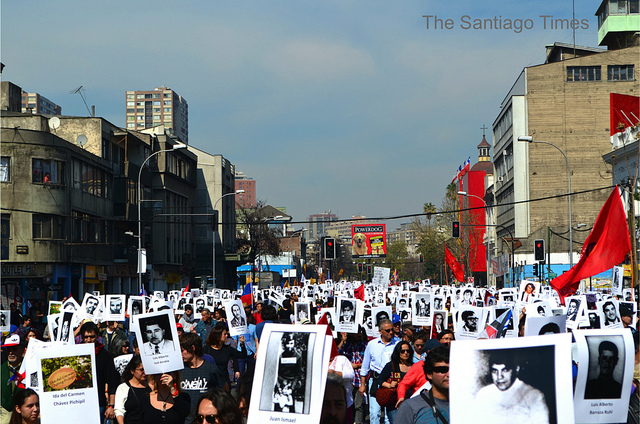Memorial remembers Jewish victims of Chile’s dictatorship
Published On: Mon, Dec 9th, 2013
As a new memorial for Jewish victims is unveiled in Santiago, family members continue to push for answers about missing loved ones.

The memorial commemorates 17 members of the Jewish community ‘disappeared’ by Pinochet’s forces.Photo courtesy of Valeria Navarro-Rosenblatt
A memorial was erected Sunday in Santiago’s Jewish Cemetery commemorating seventeen members of the Jewish community whose remains were never recovered after being “disappeared” or executed during the Chilean dictatorship.
Families and friends gathered in the cemetery to see the memorial’s unveiling and share a moment of reflection regarding their loved ones. A community leader who spoke at the ceremony expressed the community’s need for such a memorial, since the victim’s bodies could not be properly buried in the Jewish Cemetery.
“If their bodies were resting here now … this memorial would not be necessary,” he said. “Our brothers were unjustly killed and their spirits live in all of us, the family, friends and community who remember that pain.”
Engraved in the black granite monument are the words “That your souls remain linked to the bonds of life,” alongside the names of the 17 disappeared. Also written on the stone is an excerpt from the Torah, “Even unto them will I give in My house and within My walls a monument and a memorial better than sons and daughters; I will give them an everlasting memorial, that shall not be cut off.”
The stone memorial, rectangular and black, is divided by a schism down the middle to signify “the rupture in Chilean society,” Valeria Navarro-Rosenblatt, friend of one of the victims told The Santiago Times at the ceremony.
Those represented on the memorial include Diana Frida Aron Svigilsky, Carlos Berger Guralnik, Luis Alberto Guendelman Wisniak, Manuel Elias Jana Santibañez, Bernardo Lejdermann Konujowska, Georges Max Klein Pipper, Abraham Muskatblit Eidelstein, Jorge Müller Silva, Raul Pellegrini Friedmann, Jacobo Soulman Bortnik, Matilde Pessa Mois, David Silberman Gurovich, Ernesto Traubmann Riegelhaupt, Jose Joaquin Valenzuela Levi, Recaredo, Ignacio Valenzuela Pohorecky, Juan Carlos Perelman Ide, and Boris Weisfeiler Bernstein.
The final name, Boris Weisfeiler, is the only U.S. citizen among them, and is also the only U.S. citizen out of the hundreds still listed as disappeared. His sister, Olga Weisfeiler, was unable to attend the ceremony in Santiago, but was nonetheless emotional while speaking with The Santiago Times from her home just outside of Boston, Massachusetts.
“I didn’t expect the memorial to be stressful for me, but then it suddenly came, it is some kind of finality — it is in a cemetery,” Weisfeiler said. Her brother Boris, a gifted mathematician and professor at Pennsylvania State University, was hiking during the school’s winter vacation in 1984 when he disappeared.
At first Chilean officials claimed to have evidence he had died after falling into a river, although no body was ever recovered. Documents later revealed he had been arrested, but the full story of what happened to Boris has never been told. As he went missing in the vicinity of the notorious Colonia Dignidad — a commune set up by former Nazi medic Paul Schäfer used as detention center under Gen. Augusto Pinochet’s dictatorship — many believe he was tortured and killed.
The lack of information about her brother has led Olga Weisfeiler on a painful 30-year fight for answers.
“For a while I thought he was still alive somewhere, then I visited Colonia Dignidad and I realized it was impossible,” Weisfeiler told The Santiago Times.
Her mission to uncover the truth has been difficult, especially as the Chilean human rights commissions have denied her case on the grounds that they do not have an understanding of why Boris was in Chile at the time. In the areas where the case has moved forward, the investigation has been slow, although in 2012 Judge Jorge Zepeda charged eight men in connection with Boris’s kidnapping, no murder charges are possible as it is unclear what happened to the U.S. hiker. The ceremony, and a second that is set to take place at the infamous Villa Grimaldi detention center later this month, come as small positive steps for Weisfeiler.
“It came as a surprise, I had almost given up hope,” she told The Santiago Times. “I just want recognition [of what happened to Boris].”
However, this memorial has not altered anything in Olga’s mission.
“This does not change anything. I will still continue to push the judge to learn the truth,” Weisfeiler said.
She added that her goals remain for Boris’s case to be recognized as a human rights case by the Chilean government and to learn the facts, no matter how painful, of what happened to her brother. For her, learning the truth is more important than justice or court trials. Until she knows what happened, her fight will continue.
“I need to do this until I’m no longer able,” she said.
By Charlotte Karrlsson-Willis (kwillis@santiagotimes.cl) and Emily McHugh (mchugh@santiagotimes.cl)
Copyright 2013 – The Santiago Times





